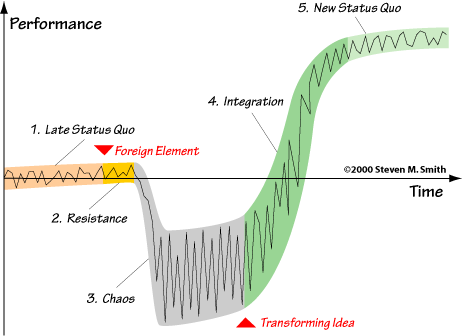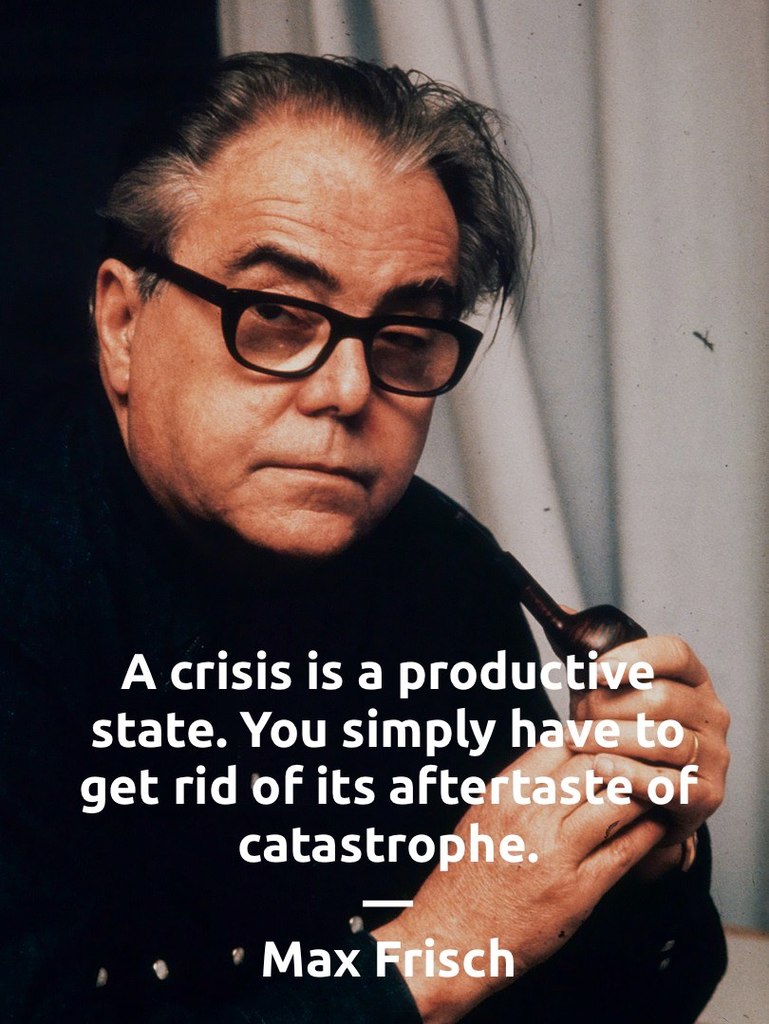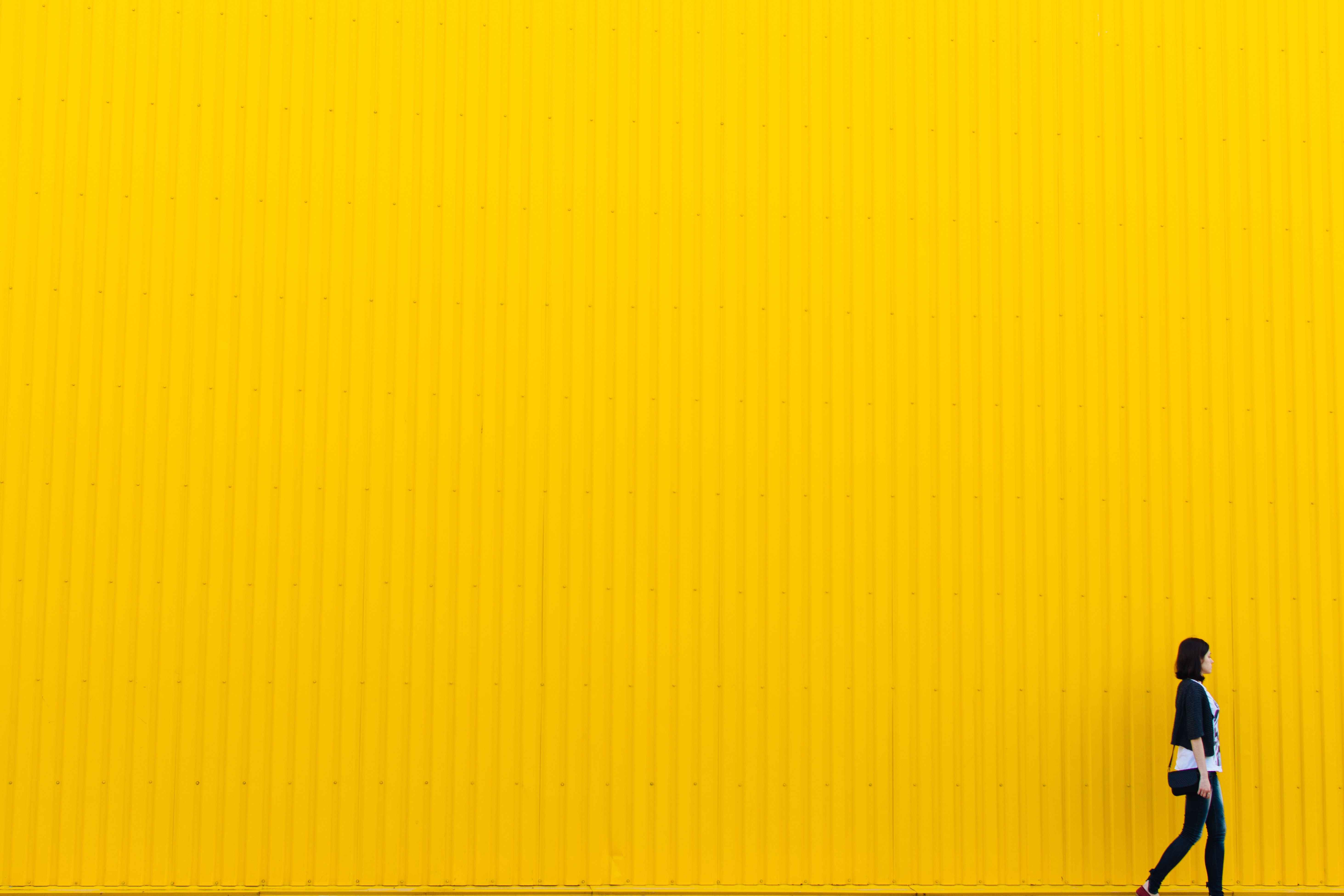Then came Corona. From one day to the next, distributed work from the home office became the New Normal. Overnight, digitalization was no longer just a decorative accessory, but critical to the system. COVID-19 has driven digitalization faster than CIO, CTO and CDO combined in the last few years. At least where organizations have embraced this change to create a better future after Corona.
The Satir Change Model
How do people cope with change? To this end, family therapist Virginia Satir has proposed a model that can be easily transferred to change processes in organizations.
A stable status quo is challenged by a foreign element. This can be a new technology that threatens the existing business model (e.g. MP3 in combination with broadband Internet), a new competitor with a different way of working and higher productivity (e.g. lean production at Toyota) or perhaps a pandemic that shows us what VUCA means and how important responsiveness and agility are.
Problems are not the problem; coping is the problem.
Virginia Satir
After initial resistance to the new, the inevitable confrontation with it leads at first to uncertainty and chaos and inevitably to a decline in productivity. Depending on the strength of this impulse and the willingness to deal constructively with the foreign element, this phase lasts more or less long until it is finally possible to understand and use the opportunities of change. Little by little, the organization then succeeds in integrating the new and using it to its advantage.

This diagram from Steven M. Smith’s worthwhile article illustrates well the model of Virginia Satir, which consists of the following five stages
- Stage 1: Late Status Quo
We have stability. Relationships, structures and processes are stable and well-established. Business as usual. - Stage 2: Resistance
The proven status quo is challenged by a foreign element. The first reactions are denial, rejection and resistance. The status quo is thereby to be preserved as long as possible. - Stage 3: Chaos
If the foreign element can no longer be ignored or combated, the stability of the status quo begins to become fragile. Relationships, structures and processes are suddenly called into question. This leads to uncertainty, fear and chaos. - Stage 4: Integration
In this stage the group recognizes how the once foreign element can be profitably integrated and used. People change their perspective on the new, begin to experiment and gain experience. Little by little, despite setbacks and mistakes in these experiments, new reliable relationships, structures and processes emerge. - Stage 5: New Status Quo
The foreign element is now fully integrated. As in the previous status quo, relationships, structures and processes are stable and steady again. But hopefully on a higher level.
Crisis as an Opportunity
Necessity is the mother of invention. Even if it may not feel that way for everyone at first and certainly not always, Max Frisch is essentially right: “A crisis is a productive state. You simply have to get rid of its aftertaste of catastrophe.”

This is especially true of the chaotic stage 3 in Virginia Satir’s Change Model. It is important to endure it and to get through it as fearlessly as possible. In it lies the seed for the new and better status quo. And this seed thrives best when people are able to enjoy experimenting with the new and foreign and ideally learn from each other.
However, the decisive factor is that leadership, especially now, on the one hand provides psychological safety on the inside and, on the other hand, ensures relentless clarity about the situation, the threat on the outside and the joint strategy to fight it. If this succeeds, one can hope for the creativity and motivation of the people concerned and thus for solutions and ways that no single captain, however brilliant, could ever imagine.
The Thing About Home Office
Overnight, the Corona pandemic made distributed collaboration the standard for many knowledge workers. Even though mobile working was already possible in principle in many companies, it remained the exception. Working from home always was second-rate, always a bit suspicious and therefore had to be justified specifically. Let’s not kid ourselves, in many places before Corona there was a distinct cult of presence and its credo was: Real work only takes place in the office and only under supervision.
This credo has now begun to falter even in traditional German companies such as Siemens and Allianz. In those companies, the impulse of the corona pandemic after the phase of uncertainty was constructively taken up and the foreign element of a standard distributed cooperation based on purpose and trust was successfully integrated into a new status quo.
The problem is not the problem. The problem is your attitude about the problem.
Captain Jack Sparrow
The crisis was not used as an opportunity everywhere. In many cases, however, people have clung and continue to cling desperately to the old status quo. The rather moderately productive meetings simply became even less productive video conferences. With a great deal of effort and discipline, it was possible to avoid being immersed in the chaos of Stage 3 in Virginia Satir’s change model for a few months. A confrontation with the new, however, does not take place because the organization, led by a captain who never leaves the bridge and never works in the home office under any circumstances, always remains in Stage 2 of resistance and denial.
Of course, from this perspective it is consistent to restore the old status quo as quickly as possible under massive safety precautions. But the retribution for this missed opportunity will come in a few years. On the one hand, companies without mobile working based on equal rights and self-determination will no longer be sufficiently attractive as employers. On the other hand, the paradigm shift towards distributed work as a standard will also bring unprecedented momentum to digitalization and, in the long run, this will significantly increase productivity compared to the current status quo of the cult of presence.





